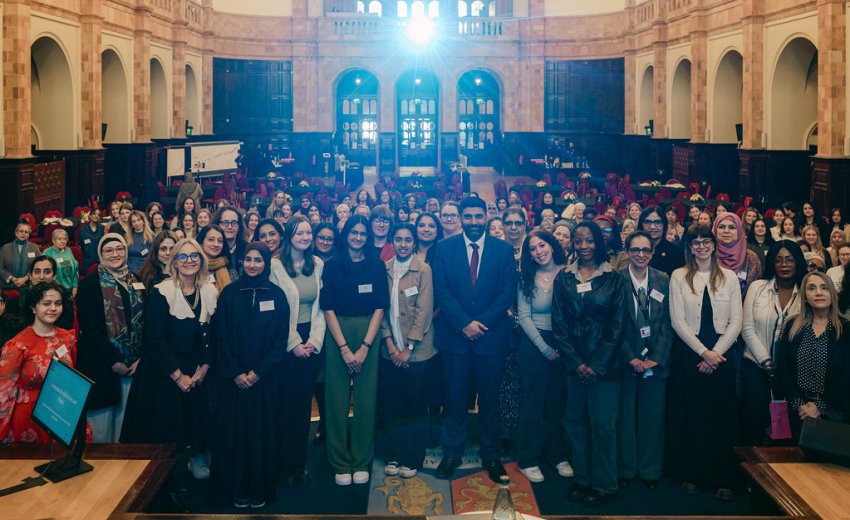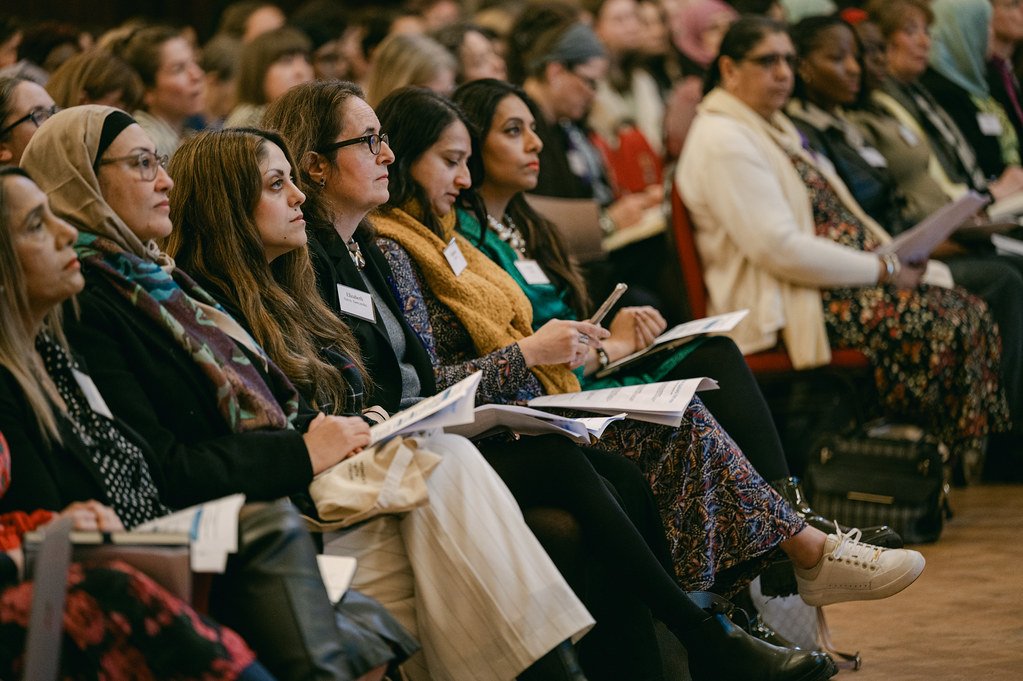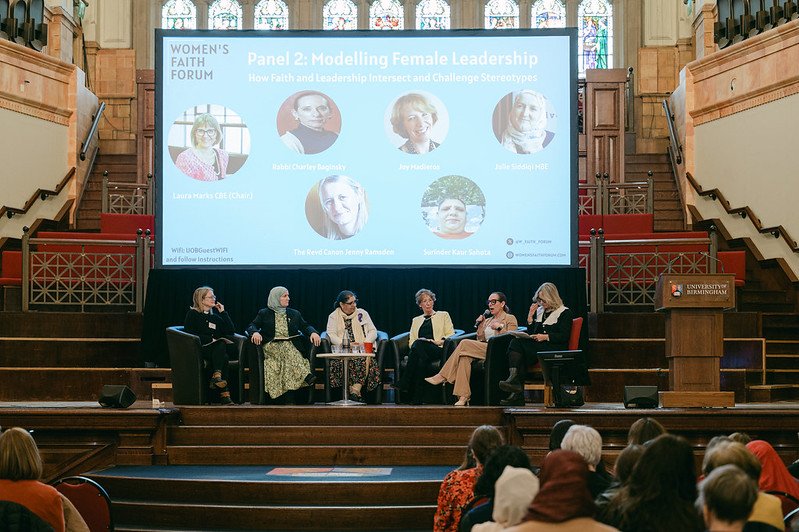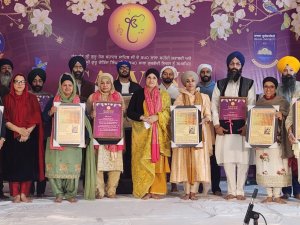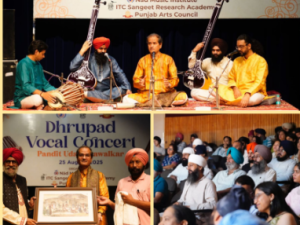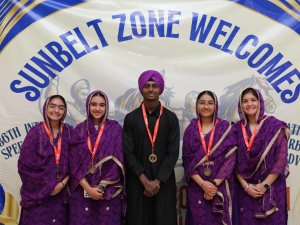A dynamic interfaith women’s conference commemorated the University of Birmingham's 125th anniversary of receiving its Royal Charter in March 2025.
March coincides with International Women’s Month, with March 8th being International Women's Day. Laura Marks, the co-founder of the Women’s Faith Forum, collaborated with Professor of Sikh Studies Jagbir Jhutti-Johal to bring together women of diverse faiths and unique political perspectives. The conference, inspired by a gathering of faith leaders, women, and young people hosted by His Majesty King Charles III at Buckingham Palace, focused on challenges impacting community relations in the UK caused by global events and how people were coming together to address them.
The 2025 Women Leading the Way Conference featured topics on overcoming barriers for women in leadership; interfaith and social cohesion initiatives led by women of faith, and fostering mental well-being, physical health, and social resilience for women with an emphasis on listening.
SikhNet Interview with Professor Jagbir Jhutti-Johal
SikhNet requested an interview with Jagbir Jhutti-Johal, a Professor of Sikh Studies in the Department of Theology and Religion at Birmingham University UK. We asked about what inspired the Women Leading the Way Conference, her part in organizing the women’s conference, and other questions about how the conference was conducted.
Jagbir Jhutti-Johal:
In this year, as we mark the 350th anniversary of the martyrdom of Guru Tegh Bahadur Ji, the 9th Sikh Guru, and the 350th Gurgadhi Diwas of Guru Gobind Singh Ji, the 10th Sikh Guru, who received Guruship in 1675 after the martyrdom of his father, Guru Tegh Bahadur Ji, we find ourselves in a world increasingly marked by polarization, religious intolerance, identity politics, and global crises—from climate change to inequality and conflict.
In these times, the teachings of Guru Tegh Bahadur Ji and Guru Gobind Singh Ji offer a powerful call to champion unity over division through moral leadership rooted in justice, equality, and compassion. This call has never been more urgent if we are to build a just world founded on fairness and harmony.
The following questions were posed by SikhNet and answered by Jagbir Jhutti Johal
Q. How and when did the idea for a women's conference come about?
A. On 24th March 2025, Laura Marks CBE (Nisa-Nashim, Mitzvah Day, Chair of the Holocaust Memorial Day Trust, and Founder of the Women’s Faith Forum) and I, Jagbir Jhutti-Johal (Professor of Sikh Studies at the University of Birmingham) hosted a high-profile conference titled Women Leading the Way: Dialogue for Reconciliation, Peace, and Community Cohesion at the University of Birmingham, in celebration of International Women’s Month. The idea for the conference emerged from a powerful meeting in 2023.
On 13th December 2023, Laura and I, were honoured to be invited to roundtable discussions hosted by His Majesty the King at Buckingham Palace. These discussions focused on the national challenges faced by faith leaders, women, and young people—particularly those brought on by international tensions and their local impact.
Laura and I sat at the women’s table, where we shared and heard deeply moving reflections about the ways women are fostering cohesion and strengthening community bonds. The conversation also brought to light the heavy responsibilities placed on women, particularly those engaged in interfaith and community work. Many navigate complex, emotionally charged environments—often without formal support or training—and frequently at personal risk. Yet, grounded in compassion and resilience, they continue to lead with remarkable strength and grace.”
Q. What motivated you personally?”
A. It was clear from that conversation that more needed to be done. As co-founders of the Women's Faith Forum, we have long been committed to ensuring that women’s voices are better heard—particularly by policymakers. We believe that women, as mothers, daughters, carers, community builders, and facilitators, are uniquely positioned to bridge divides and lead the way, regardless of political or ideological differences.
During that meeting, the women’s table expressed a strong and heartfelt desire to organize a follow-up meeting to carry the conversation on. I also remember how when the King joined the young people's table His Majesty remarked, "Women are going to sort it all out" (Cheerful Charles Hosts Faith Leaders at Buckingham Palace – YouTube). Inspired by that moment, Laura and I felt compelled to take the conversation further—to keep it alive—and to address ongoing tensions, particularly, though not exclusively, those stemming from global conflicts.
The theme for International Women’s Day 2025, "Inspire Inclusion," aligned perfectly with the discussions we had started in December 2023. It reinforced the importance of embracing women’s inclusion as essential to building a more just and peaceful world. This became the driving force behind the conference – we wanted to be inclusive and ensure visibility of women so that they are included in policy discussions that affect them. All the women involved in the Palace event were invited, and we were proud to welcome over 170 women activists from diverse backgrounds.
A key goal of the conference was mentorship—creating opportunities for intergenerational dialogue and connection between young women and established activists. We believe these relationships are not only valuable but essential for sustaining momentum and empowering the next generation of changemakers.
Personally, I am deeply passionate about ensuring that women and young people have a seat at the table—whether that means shaping policy or leading within their communities. I also believe that those of us already in leadership roles have a responsibility to mentor, guide, and support emerging voices. We must equip them with the skills, confidence, and vision to carry forward the work we’ve begun.”
Q.What were the key topics? Did you have speakers or a panel with questions and answers?
A. The conference opened in the Great Hall with a morning of registration, networking, and refreshments, creating a warm and welcoming environment for the 170+ women activists and guests in attendance. Following introductory remarks from the Vice Chancellor, a speech sent in by the Deputy Prime Minister which set the tone for the day was read out. She wrote”:
“As you will know this is a cause close to my heart, and I want to salute your incredible efforts to bridge divides, bring people together and make a difference.
This is the power of female leadership at its most inspiring.
When it comes to the fight for social justice, for peace and unity in the face of division and conflict…
…for everything from a stronger economy to a safer, more cohesive society…
…we cannot go forward without women leading the charge.”
The first panel, chaired by Lord Khan, explored critical themes such as gender inequality, barriers to leadership for women—especially from minoritized backgrounds in healthcare and education for example. This was followed by a dynamic panel, chaired by Laura Marks, showcasing women faith leaders—including Rabbi Charley Baginsky, Revd Jenny Ramsden, and Julie Siddiqi—who shared how faith and leadership intersect to challenge stereotypes and foster inclusion.
Lunch was paired with moderated discussion groups, allowing participants to delve more deeply into the morning’s themes. The afternoon offered three parallel sessions. In the Senate Chamber, young women explored barriers and opportunities in leadership in a session chaired by Universities UK CEO Vivienne Stern. Simultaneously, the Great Hall hosted a panel on innovative, women-led models of social cohesion, featuring speakers from a range of interfaith initiatives. A third session focused on how women are modelling mental, physical, and social resilience through community, policing, and digital safety work. After a brief tea break, Bishop Dagmar Winter delivered a powerful reflection on "Faith and Forging the Future Through a Women’s Lens," bringing the formal programme to a thoughtful close. As it was Ramadan the day concluded with a breaking of the fast in the Dome with ISOC, marking a symbolic and spiritual moment of unity.”
Q. I can see from the photos that nearly all of the attendees were women. Were these women mostly associated with the University, students, staff etc?
A. The event brought together women activists of all ages—seasoned leaders, emerging voices, and young female students—with a shared passion for interfaith work, peacebuilding, social cohesion, and community integration. It was a space led by women, for women—those long established in their fields and those just beginning their journeys. Women from all major faith traditions—Christian, Catholic, Hindu, Sikh, Muslim, Bahá’í—as well as smaller faith groups and women of no religion came together in a spirit of unity and shared purpose. Lord Khan of Burnley, Parliamentary Under-Secretary of State (Lords Minister for Faith, Communities and Resettlement), was the honorary male in the room. He was invited to witness the powerful contributions of women and to see firsthand the incredible work being led by women across communities.”
Lord Khan of Burnley said: “It was an honour to be part of this inspirational event, celebrating and highlighting the power of female leadership and how critical that is to fight for social justice and unity in the face of division and conflict.
I am determined that our collective efforts to rebuild interfaith relations must include the equal representation of women, and a much more significant role for young people – and this opportunity to hear the inspirational stories of so many brave and powerful women has been a huge privilege.”
Q. What were the key takeaways, that can be used practically in everyday life, and in a broader sense communally, politically etc.
A. The conference powerfully demonstrated that women—of all ages, backgrounds, and beliefs—are already doing extraordinary work in their communities, often without recognition or the policy influence they deserve. It reminded us that women are not just contributors to peacebuilding and social cohesion—they are leaders and must have a seat at the policy table. It was clear that this cannot be a one-off event. If something matters, it deserves sustained attention and continuous dialogue. The energy, insight, and expertise shared reinforced the urgent need to create lasting structures that ensure women have a permanent seat at decision-making tables—whether in policy, community leadership, or interfaith engagement.”
Q Is there anything else that you would like readers to know.
A. As a Sikh woman, I am guided by the timeless teachings of our Gurus, who championed the values of listening, dialogue, and equality. Through my work with women – who embody these values I view women as beacons of light—actively dismantling divisive narratives and fostering unity across humanity.
Women lift each other up—creating room, amplifying each other's voices, and standing in solidarity. Those who hold privilege and platforms must embody the principle of Sarbat da Bhalla—the Sikh commitment to seeking the welfare of all— and actively use our influence to highlight key issues and elevate the voices of those too often unheard. In doing so, we take real steps toward a more inclusive, compassionate, and equitable world.”
SikhNet Perspective
Gurbani tells us that a gurmukh “listens” to become attuned to naam, truth, and divine love, to be imbued with shabad, to attain the supreme soul, and find peace. Naam is obtained from Satguru. With naam, everything is revealed, and understanding obtained.
A conference is much more than sharing ideas, it involves listening to others' ideas to form a cohesive framework for understanding, unity, and peace, based on compassion and cooperation, so that the needs of all are met.
We look forward to a world where women take more active roles in “just” leadership, and are grateful to the women who make conferences like Women Leading the Way possible, so that hope is possible.”
